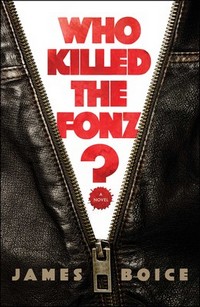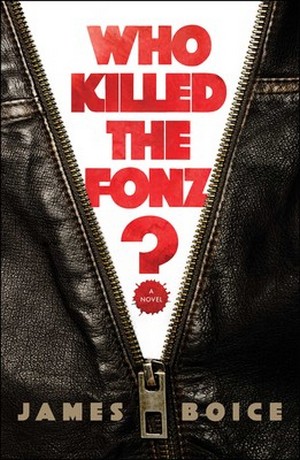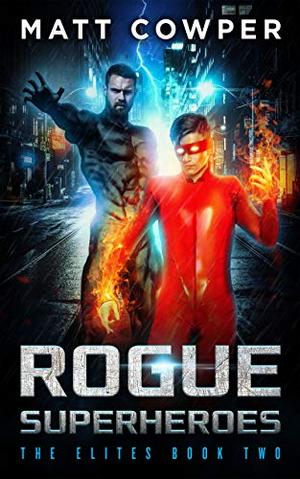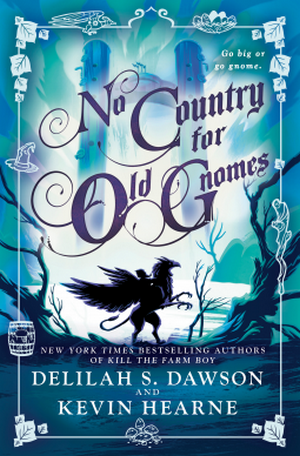 Who Killed the Fonz?
Who Killed the Fonz?
by James Boice
Hardcover , 208 pg.
Simon & Schuster, 2019
Read: March 9, 2018

“Everyone gets old,” said Ralph. “No one stays cool forever. Not even the Fonz.”
Like almost every American of a certain age — I have warm memories about the show Happy Days. Granted, my memories are a bit hazy — the show premiered when I was a few months old, but I was 10 when it ended. So I know I watched a lot of it between the first-run episodes and syndication (surely, someone syndicated those and I watched them) — I mean, we had 3 channels (plus PBS), what else were we going to do? I remember very little about it — I thought Potsie was kind of annoying, Ralph was hilarious, I didn’t care too much about Joanie or Chachi, and the Fonz? I mean . . . who didn’t want to be Fonzie? For everyone in my generation, our first exposure to the concept of “cool” our first symbol of it, the avatar of coolness was Arthur “Fonzie” Fonzarelli.
I have clear memories of being 5 (+/-) and being at a semi-local amusement park riding a Carousel that in addition to animals, had some cars you could ride in — or motorcycles. I hopped on those motorcycles and every time I went around to where my parents were standing and watching, I’d give them a big thumbs up and an “Ayyyyyyy.”
What I’m trying to say is that I am a full-fledged member of the target audience for this book. But then again, pretty much everyone alive who’s roughly my age or old is, too.
This novel takes place in late October of ’84. Filmmaker Richard Cunningham’s career is on the skids, he’s got an epic movie he’s been trying for years to make, but no one wants him to (today we’d call it Oscar-bait, his agent and movie companies considered it to be Box Office poison); he’s just spent time talking to friend/contemporary “Steve” about his new time travel movie with the kid from Family Ties and his agent is trying to get him to write a script for a well-funded Star Wars-knock off.
The poor guy is having a rough day . . . and then he gets home to learn that his old friend, Arthur Fonzarelli has been in a wreck on his beloved motorcycle and is dead. Granted, the two had lost touch, but the knowledge that the Fonz is dead shakes Richard to his core. He quickly makes arrangements to head back to Milwaukee to attend the funeral. Neither his mother (who lives in his home) or Lori Beth can make the flight, so he’ll stay in Joanie and Chachi’s house (they’re on vacation and can’t catch a flight home in time to attend). Shortly after arriving, he runs into Al, Ralph, Potsie — and even the jukebox.
Very quickly, Boice has set the tone (nostalgic, amusing, and wistful) and ticked off the major boxes when it comes to fan-service. He’s going to have some fun with and even re-examine some aspects of the series (see the conversation that opening quote came from) — but he’s going to do it with respect for the source material. This isn’t The Brady Bunch Movie, but it’s not a slave to the original (see, Superman Returns).
That accomplished, he puts Richard into new territory — he’s brought out to the home of a Wisconsin gubernatorial candidate, who wants him to write a commercial for the final days of the campaign — Richard even agrees to direct it. This gives him time to decide if he wants to follow his agent’s wishes as well as an excuse to stay in town. Which he needs once he’s given some information that leads him to conclude that Fonzie wasn’t the victim of an accident, but was murdered.
So Richard has to figure out the direction of his career, convince anyone else that the Fonz was killed and/or find the killer, in a matter of days. All the while coming to terms with being home for the first time since he left for Hollywood, just days after coming home from the Army.
You make this a novel about struggling filmmaker Robert Cummings, returning to Detroit for the funeral of his old friend Frankie — free and clear of pre-existing pop-culture prejudices and baggage — and I’d still probably like t his book. Not as much, but it’d still be good. Wrap this up in beloved characters? The pretty good book becomes something else.
The identity of the killer was pretty clear soon after Richard started thinking about it (maybe even before then), and the motive seemed semi-obvious. But a big reveal close to the end changed the stakes significantly and made the motive and identity much more believable. And like with so many mysteries, the “whodunit” is less important than the journey taken to get to the revelation of the identity — and this journey rocked. Richard’s introspection and self-assessment was well-handled, as was his getting re-acquainted with his old high school friends, seeing what they’d made of themselves, etc. There’s a good balance of sentiment and story here — not unlike a certain situation comedy at its best.
I read this in one sitting, which I love doing, and the book moved along so nicely I didn’t even think about putting it down for any reason. It’s a thoughtful read, but not a ponderous one. It’s a murder mystery, but there’s only one or two moments of danger — it’s very much on the cozy side of the street, and can easily appeal to people who’d never read a murder mystery. It’s lightly told and frequently amusing, but not very comedic. I will say that I laughed once — thanks to Ralph, of course. While frequently amusing, this wasn’t a comedy — but Boice was able to use Richard’s friends to lighten a pretty tense moment — and to use that incident to push the story along rather than detract from the story. It’s not a grab you and won’t let go, kind of book — but it’ll easily keep you engaged.
The nostalgia starts with the Table of Contents (I’m serious here) and flows right to the last page, but never dominates anything. Boice keeps it from being schmaltzy or cheap, it’ snot just about the show, it’s about the characters (which I think would be particularly difficult with this group). This gets a strong recommendation from me — even if you end up not liking it as much as I do, I can’t imagine anyone walking away from this anything but happy about the time they spent with it. It’s one of those that gets better the more you think about it — the way that Boice built-on the foundation of the series and yet created something wholly original (and possibly deserving of a sequel, as long as it didn’t involve a murder) is truly impressive.
—–

![]()






